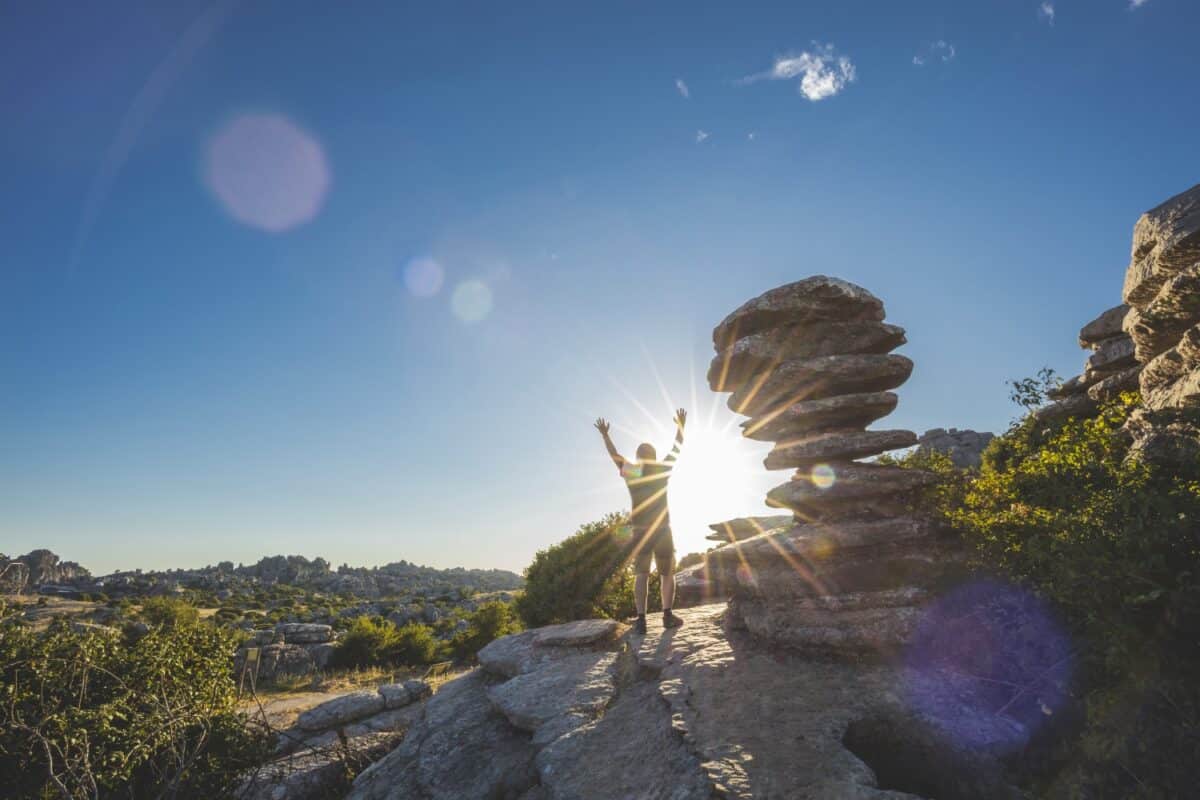At the bottom of Earth’s Mother Continent lies the beautiful and unique land of South Africa. Containing the largest amount of proto-human fossils in the world, it’s home to what archaeologists call ‘The Cradle of Humankind’ (the hypothesised birthplace of homo sapiens).
Along with its rich cultural history, South Africa also boasts diverse and stunning natural landscapes, including deserts, scrub, grasslands, beaches, and savannahs.
Nestled within these gorgeous and exhilarating surroundings, residents at White River Manor can easily harness the power of the local habitats. We’ve seen for ourselves how experiencing this nature sets clients up for long-term sobriety. Within the scientific literature, the healing power of nature has been widely confirmed, making the awe-inspiring setting of South Africa an ideal location for recovery.
What makes South Africa’s nature unique?
The natural landscapes of South Africa are undeniably special—the Drakensberg mountains rub shoulders with vast, golden savannas, and rugged coastlines stretch as far as the eye can see. This rich diversity has birthed a range of unique biomes, making South Africa a hub for a variety of flora and fauna. Amazingly, the Rainbow Nation boasts 10% of the world’s bird, fish, and plant species, along with 6% of its mammal and reptile species.
The country’s Cape Floral Kingdom—the smallest yet richest of the world’s six floral kingdoms—is home to plants you can’t find anywhere else in the world, and almost 70% of its 9,000 plant species are unique to this region. From vibrant fynbos fields to endemic proteas, it’s a botanical paradise for any nature lover.
Of course, South Africa’s natural beauty extends well beyond plant life.
Taking a safari tour gives you a high chance of witnessing the ‘Big Five‘ in action; the leopard stealthily stalking its prey, the majesty of the mighty elephants and rhinos, or the raw power of lions (when they aren’t sleeping!).

Then there are the coral reefs and marine ecosystems, home to myriad fish species, penguins waddling on beaches, and whales breaching the ocean waves.
All in all, the breadth of South Africa’s natural landscapes and wildlife creates an unforgettable tapestry; one that won’t only leave an indelible impression but can also be incredibly healing and empowering for recovery.
Tapping into biophilia
There’s something magical and indescribable about being immersed in nature. We don’t fully understand the impetus, but we are all distinctly aware of it on some level. Even just observing the fissures in the bark of a tree can foster a sense of peace and connection unlike any other stimuli; we feel it on a primal level.
First introduced by psychoanalyst Erich Fromm and later popularised by biologist Edward O. Wilson, the concept of ‘biophilia’ (meaning ‘love of living things’) refers to our inherent inclination to form connections with other life forms. This relationship can be seen in the universal appreciation for the natural world, symbolic nature-related idioms in language, and spiritual reverence observed across the globe.
While the technological advancements of our age disrupt this fundamental connection, biophilia stubbornly persists.
Some of the strongest evidence for the phenomenon lies in studies of its opposite, ‘biophobia’: an instinctive fear and respect for aspects of nature that could be dangerous. This reaction is ingrained in our biology, and harks back to an evolutionary past when survival demanded a keen awareness of our environment.
Whether through a love of nature or the need to remain vigilant to its potential threats, our bond with organic life is deep-rooted. By tapping into your capacity for biophilia, you can open yourself up to the numerous benefits of the natural world—benefits that scientific research has repeatedly confirmed.
The health benefits of nature
Today, the positive effects of nature on health and wellbeing are well known. For those in recovery, it can serve as the perfect supplement to other treatments (such as mindfulness or group therapy), providing you with the much-needed space for integration and self-growth.

Today, its therapeutic potential is being explored more and more, with the combination of talking therapy and natural spaces yielding positive results.
Below are just some of the many science-backed health benefits of nature.
Relieves stress
According to research published in 2019, a mere 20 minutes spent in a natural setting can result in significant decreases in cortisol (the body’s primary stress hormone). The release of cortisol can trigger the ‘fight or flight’ state in the body. As a result of trauma, many people who suffer from addictions or mental health issues are familiar with this constant state of high vigilance.
However, by lowering these cortisol levels, nature experiences can effectively mitigate your physical response to stress. This was confirmed by a study from 2019 on nature-based activities. Ultimately, communing with organic life can help to break the cycle of chronic stress, something so often intertwined with addictive behaviours.
Improves your mood
Numerous studies have shown that nature can enhance mood and mitigate depressive symptoms. This research involving 1252 participants, found that:
“Every green environment improved both self-esteem and mood (and) the presence of water generated greater effects.”
Given that addictions often negatively impact the moods of those affected (neurochemically and psychologically) the mood enhancement nature provides can contribute to maintaining sobriety. Moreover, regular exposure to nature can help foster a healthier emotional state, supporting overall better mental health.
Sharpens your mental focus
Believe it or not, a simple stroll through the woods or walk along a beach can boost your cognitive function. A study from 2015 showed that nature walks could reduce rumination—a pattern of repetitive, self-focused thoughts common within addiction. It found that:
“… accessible natural areas may be vital for mental health in our rapidly urbanizing world.”
Furthermore, research shows that engagement with nature significantly improves working memory, cognitive adaptability, and the ability to control attention. This enhancement can support therapies such as Cognitive Behavioral Therapy (CBT), meaning nature can serve as an invaluable adjunct to traditional therapeutic strategies.
Enhances the benefits of exercise

Today, it’s universally understood that exercise is fundamental to overall wellbeing and beneficial for those in recovery—but did you know that nature can significantly enhance its benefits?
A systematic review conducted in 2011 showed when compared to exercising indoors, exercising in natural environments leads to greater feelings of revitalization, increased energy, and positive engagement, along with decreases in tension, confusion, anger, and depression.
What’s more, when you engage in physical activity outdoors, you also stimulate the production of endorphins, (your body’s natural mood boosters). These ‘feel-good’ hormones not only reduce anxiety levels but also generate a natural sense of euphoria—a healthy replacement for the destructive highs of addictive substances.
Improves your sleep

Exposure to natural light, especially in the morning, can regulate sleep patterns often disrupted by addiction. This 2019 study showed that spending time outside helps to synchronise your circadian rhythm.
Disruptions in the body’s internal clock have been linked to various health issues, including depression and substance use disorders. By helping to restore a normal sleep-wake cycle, exposure to nature can support the restoration crucial for your recovery process.
Boosts your resilience
Outdoor nature activities have been shown to foster resilience—a crucial trait for overcoming addiction. This 2019 study suggested that outdoor experiences could stimulate resilience and personal growth.
Encountering and overcoming challenges in nature can lead to increased self-confidence and a greater sense of personal agency—both of which are critical to resisting the pull of addictive behaviours. This resilience can help you adapt to life’s ups and downs without resorting to unhealthy coping mechanisms.
How green spaces can mitigate cravings
What if we told you that simply being near nature can reduce cravings? In 2019, Plymouth University conducted a study that proved just that. It analysed various facets of an individual’s access to and exposure to green spaces. Participants filled out surveys to identify the correlation between their exposure to nature and cravings for alcohol, cigarettes, and unhealthy foods.
The study found that access to a public garden or allotment was linked with a reduction in both the strength and frequency of cravings. Moreover, those who had residential views comprising 25% or more greenery experienced similar outcomes.
The research also explored the relationship between physical activity in green spaces and cravings. Interestingly, the findings indicated that the reported reduction in cravings was not dependent on the levels of physical activity. This suggests that merely being in green spaces, irrespective of activity level, can contribute to the mitigation of cravings.
Now, bearing this in mind, imagine you’re at White River Manor, with the breathtaking nature of South Africa on your doorstep. If having a residential view of a park can reduce cravings, just think what the sweeping savannah could do!
White River Manor—a natural gateway to healing

As we’ve shown, the connection between nature, wellbeing, and recovery is becoming increasingly evident. From reducing stress to enhancing mood to boosting resilience, the natural world can be a formidable ally on your journey to sobriety.
Committed to a holistic approach, our personalised treatment plans marry professional medical support with the profound healing power of the local environment—and we’ve witnessed firsthand the vital role nature can play in recovery,
Being situated in one of the most diverse and beautiful environments in the world, White River Manor is uniquely-placed to integrate nature into its recovery programs. Our luxury centre provides numerous nature-based activities, such as going on an exciting Safari Tour, taking part in conservation activities, or sauntering through our picturesque botanical gardens.
Few recovery centres can offer such an amazing opportunity: to explore the jaw-dropping beauty of South Africa while carving your path to sobriety in luxury and comfort.
If you’d like to talk to us about our treatment plans and how we combine nature with recovery, please don’t hesitate to contact us.







